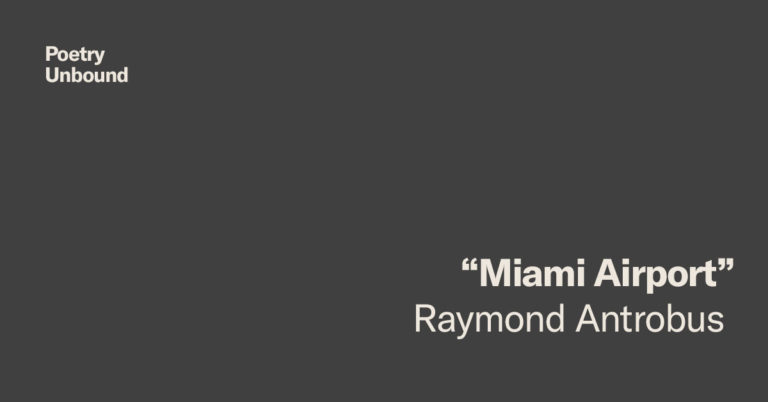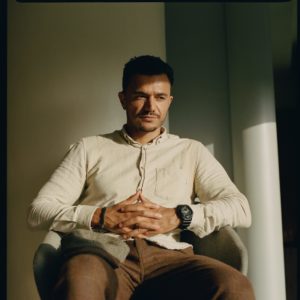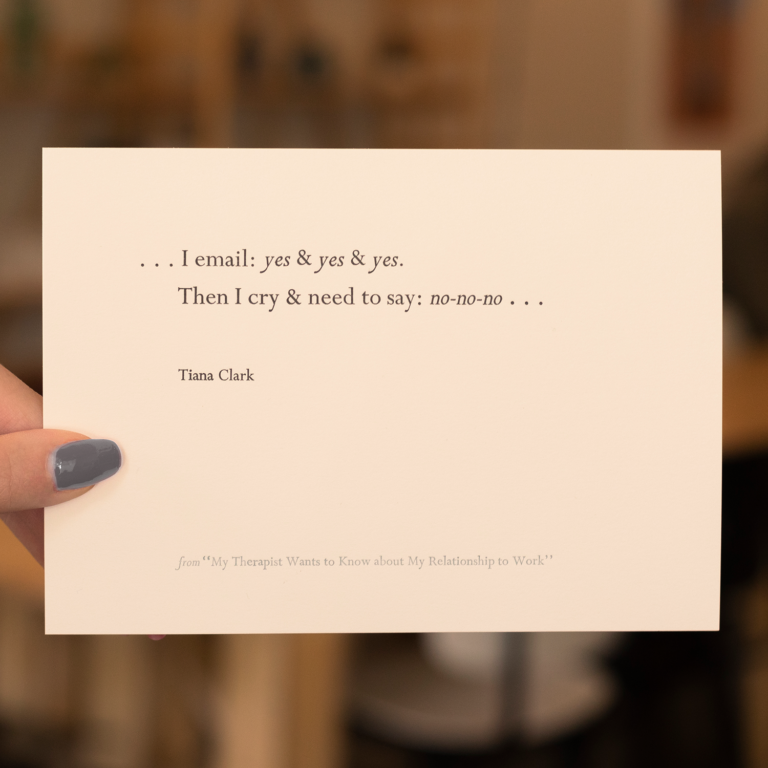Raymond Antrobus
Miami Airport
Raymond Antrobus’s poem “Miami Airport” bears witness to the disempowerment that comes when you’re not believed. The voice of the poet is absent, and all we hear is an interrogator seeking to disrupt and displace. This space of suspicion creates anxiety, transporting us to the places and times when someone has questioned the truth of our story.
A question to reflect on after you listen: When have you felt disempowered by questions about yourself? Did you find your voice again? How?

Guest

Raymond Antrobus is a freelance poet and teacher. He is one of the world’s first recipients of a MA in Spoken Word Education from Goldsmiths, University of London and is the recipient of the Geoffrey Dearmer Award by the Poetry Society (judged by Ocean Vuong). He has received fellowships from Cave Canem, Complete Works iii, and Jerwood Compton Poetry.
Transcript
Pádraig Ó Tuama, host: My name is Pádraig Ó Tuama. I’m a poet from Ireland. And poetry has helped me feel seen since the day I read a stanza from the Aran Islands off the west coast of Ireland, Máirtín Ó Direáin. And the stanza says, [Irish]. And the translation of that is difficult, but it says something like “As lonely as a tree in the middle of the wood is, so is a poet among the people.” And I remember reading that poem and learning it off by heart when I was ten, and I didn’t know why, but I knew that the honesty about the reality of loneliness helped me say something that I knew would be important for the rest of my life.
[music: “What Did You Not Hear?” by Gautam Srikishan]
“Miami Airport” by Raymond Antrobus:
“why didn’t you answer me back there?
you know how loud these things are on my waist?
you don’t look deaf?
can you prove it?
do you know sign language?
ID?
why didn’t I see anyone that looked like you
when I was in England?
why were you in Africa?
why don’t you look like a teacher?
who are these photos of?
is this your girlfriend?
why doesn’t she look English?
what was the address you stayed at?
what is the colour
of the bag you checked in?
what was your address again?
is that where we’re going to find dope?
why are you checking your phone?
can I take your fingerprints?
why are your palms sweating?
you always look this lost?
why did you tell me your bag was red?
how did it change colour?
what colour are your eyes?
how much dope will I find in your bag?
why isn’t there dope in your bag?
why did you confuse me?
why did you act strange when there was nothing on you?
would you believe
what I’ve seen in the bags of people like you?
you think you’re going
to go free?
what did you not hear?”
So this poem is a sequence of 30 questions, or 30 interrogations. And the poem doesn’t say, “OK, so this guy came up to me who was official and was wearing a uniform, and he asked me these questions, and this is what his tone was like.” The poem doesn’t need to do that. But by simply putting all of those 30 questions there, you’re brought into a sense of panic. And then it brings you to a sense of relief. And for a little while, towards the end, you think, OK, so nothing’s been found in his bag. Great. And then it brings back this menace. “you think you’re going / to go free? / what did you not hear?” And that last question — what did you not hear? — isn’t about what’s happening in that airport. It’s saying, what did you not hear about a system of power; like, “This is just today’s version of that. Did you not hear that this is gonna continue?” It’s like a curse at the end.
So Raymond Antrobus is British-Jamaican. His father was Jamaican; his mother’s British. And lots of his poetry circles around questions about identity. And here, he is a foreigner; he’s at Miami Airport, and the questioner at Miami Airport is saying to him, “When I was in England, I didn’t see people who looked like you.” And so the questioner is saying, “When I’m in your country, I’m an authority there, also. I’m an authority, whether in my country or, even, in yours.”
And all of that is saying: I’m looking at you, and I’m asking questions about origin, and I have an origin story about you that I can only read negatively.
Raymond is deaf. And lots of his poems circle around the experience of deafness. And so, the opening questions in this are all about him, having been called back and, clearly, not having heard a person calling him, and then that person saying, “Why didn’t you?” And then him, having to explain that; and then the person saying, “Really? Are you deaf? Prove it to me, that you’re deaf.” And there’s a way, here, where somebody is not considered to be an authority in their own life, and deaf is being read, in this context, as being negative.
Recently, I was at an airport, and everybody was being stopped, going through the customs. And I went up, my Irish passport, pasty-white skin — “Yep, go on through.” And I found myself thinking, what is that? And feeling guilty won’t change that. I can do nothing, handing myself in and saying, “I want you to check me.” [laughs] What do you do in that situation? And I found myself thinking of the vast powers that are at play and the way in which powers pay attention. And our powers are regularly communicating that second-last question — “you think you’re going / to go free?” — and continually reaffirming something.
I think there’s a fundamental human experience about being believed. And you can track into this by asking groups of people, “When have you been disbelieved?” And then make all the time in the day you have to listen to everything that unfolds from that. And so many people have stories of being disbelieved, of not being an authority in the story of your own life and having to be gently defensive with somebody who was aggressively questioning and finding the way to be ten times more magnanimous to somebody who has absolutely no interest in being kind towards you in the context of their questioning.
And I have found it an opening question, with groups of people in group work in the context of conflict, over years, to say, “Can everybody here, as we gather together, tell a story of a time when you were disbelieved?” and then to think, what is the collective wisdom in the room about what that communicates to us and what is the human condition that is oriented towards feeling respected when we are believed, because you can turn the question around again, to say, “When have you been believed? And what’s that like?”
“Miami Airport” by Raymond Antrobus:
“why didn’t you answer me back there?
you know how loud these things are on my waist?
you don’t look deaf?
can you prove it?
do you know sign language?
ID?
why didn’t I see anyone that looked like you
when I was in England?
why were you in Africa?
why don’t you look like a teacher?
who are these photos of?
is this your girlfriend?
why doesn’t she look English?
what was the address you stayed at?
what is the colour
of the bag you checked in?
what was your address again?
is that where we’re going to find dope?
why are you checking your phone?
can I take your fingerprints?
why are your palms sweating?
you always look this lost?
why did you tell me your bag was red?
how did it change colour?
what colour are your eyes?
how much dope will I find in your bag?
why isn’t there dope in your bag?
why did you confuse me?
why did you act strange when there was nothing on you?
would you believe
what I’ve seen in the bags of people like you?
you think you’re going
to go free?
what did you not hear?”
Lily Percy: “Miami Airport” comes from Raymond Antrobus’s book The Perseverance. Thank you to Penned in the Margins, who published the book and gave us permission to use Raymond’s poem. Read it on our website at onbeing.org.
Poetry Unbound is Tony Liu, Chris Heagle, Kristin Lin, Erin Colasacco, Serri Graslie, Eddie Gonzalez, and me, Lily Percy. Our music is composed and provided by Gautam Srikishan. This podcast is produced by On Being Studios, which is located on Dakota land. We also produce other podcasts you might enjoy, like On Being with Krista Tippett, Becoming Wise, and This Movie Changed Me. Find those wherever you like to listen, or visit us at onbeing.org to find out more.





